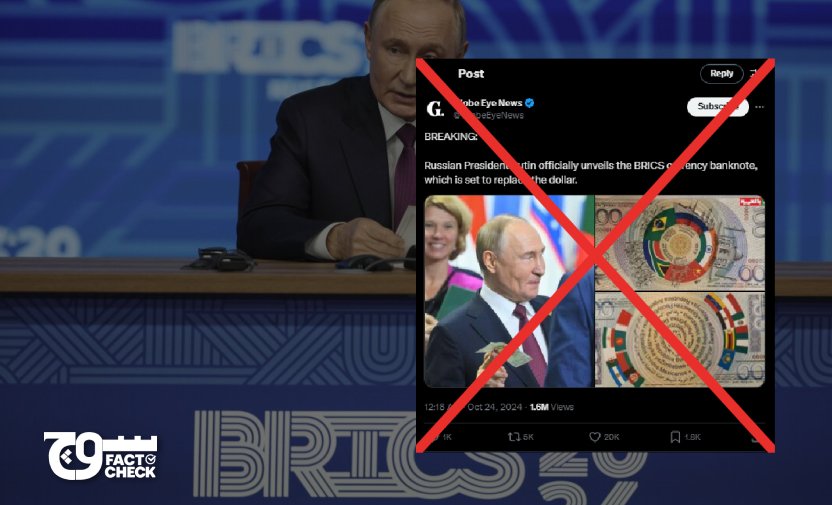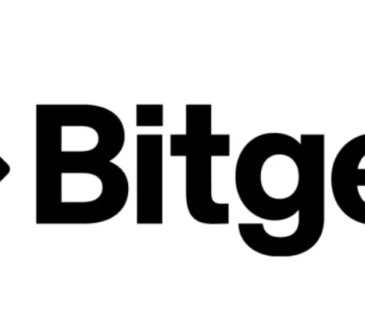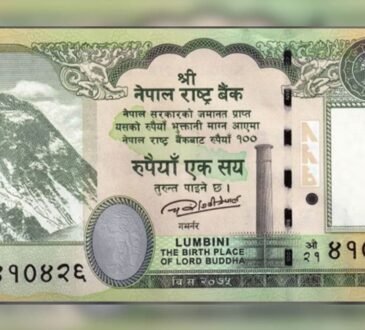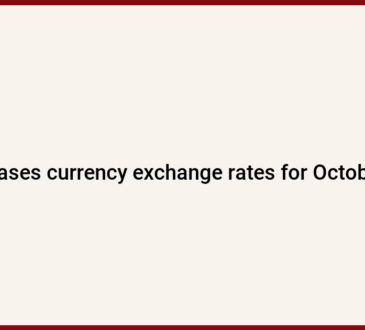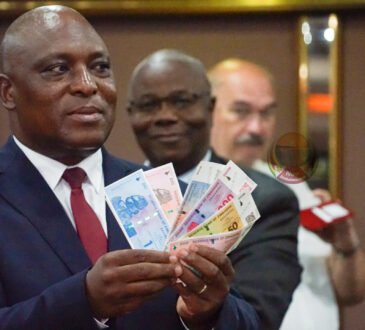Claim: President Putin introduced a new BRICS currency to replace the US dollar in international trading.
Fact: The currency note shown in the images in the claim was simply a mock-up presented to President Putin as a gift at the 16th BRICS Summit 2024. No such currency has been officially introduced.
On 23 October 2024, a user on X (formerly Twitter) posted images (archive) of President Vladimir Putin holding a new currency note as well as close-up shots of the note. The post is captioned, “BREAKING: Russian President Putin officially unveils the BRICS currency banknote, which is set to replace the dollar”.
What is BRICS?
BRICS is an intergovernmental organisation that originally consisted of Brazil, Russia, India, and China. South Africa then joined in 2010. Iran, Egypt, Ethiopia, and the United Arab Emirates followed, joining the organisation in 2024. Originally focused on economic growth and development, BRICS has since evolved into a geopolitical alliance. The concept was first introduced by Jim O’Neill, Chief Economist at Goldman Sachs, in his 2001 paper titled “Building Better Global Economic BRICs,” where he identified investment opportunities in emerging markets. However, the organisation has now positioned itself as a greater voice for emerging economies and a counterweight to the G7 on the global stage. The 16th BRICS Summit was held this October, in Kazan, Russia.
Why a new currency?
According to reports, part of Putin’s hopes for what BRICS achieves is the establishment of a BRICS currency and de-dollarisation. The United States dollar wields unique power on the international platform as the currency of choice for international trade and finance. As such, countries and businesses often use the dollar for transactions and it acts as the world’s primary reserve currency even when the US is not directly involved, because of its stability, liquidity, and global acceptance. For example, because of the sharp devaluation of the Pakistani rupee and its instability, international traders such as the UAE and their business partners prefer to make trade deals with Pakistan that include payments in US dollars as it would safeguard the value of transactions.
This gives the US significant influence over global trade and finance. For instance, US sanctions can have a powerful impact because they limit access to dollar-denominated financial systems. It also means that the global economy is somewhat reliant on the US monetary policy, giving the Federal Reserve power to shape global economies.
Reportedly, sanctions, more than anything, have pushed countries to examine the idea of pursuing a new currency, as countries are wary of the US’s use of it. In the case of President Putin, Russia has faced serious US sanctions since it invaded Ukraine. $282bn of Russian assets held abroad were frozen and Russian banks were disconnected from SWIFT, a global financial tool that is used for international payments. America also threatened to impose “secondary sanctions” on banks in other countries that supported Russia in its invasion.
At present, Russia is not alone in its concern, China also believes its reliance on the US dollar to be one of its biggest security threats.
Fact or Fiction?
Soch Fact Check conducted a keyword search to find reports of a new BRICS currency but found no credible reports to support the claim. Though many outlets reported on de-dollarisation being a focus of the current BRICS Summit and President Putin, none of the reports confirmed the introduction of a new currency.
In fact, while outlets reported that Putin is pushing for a de-dollarised system, calling the use of the dollar by the US “a political tool” that “undermines trust in the currency”, other BRICS members namely Brazil and India were not keen on the idea. The Guardian reported that the countries do “not want their rapidly expanding club to become solely pro-Chinese and anti-western.” Adding to this, we found that The Washington Post spoke to Kanwal Sibal, former foreign secretary in India and former ambassador to Russia, who stated that, “For us, the United States is by far the most important partner in terms of our future growth and technologies and access to technologies, and therefore, we don’t want a situation where BRICS become the focal point of conflict with the West on the economic political fronts.”
A recent report by The Economist highlighted the significant challenges BRICS would face in creating a new currency and suggested that such a currency is unlikely to be established anytime soon, further confirming the claim is false. The report noted the challenges writing, “Any rival BRICS payments system will still face huge challenges. Guaranteeing liquidity will be difficult or require large implicit government subsidies. If the underlying flows of capital and trade between two countries are imbalanced, which they usually are, they will have to accumulate assets or liabilities in each other’s currencies, which may be unappealing. And to scale up a digital-currency system, countries must agree on complex rules to govern settlement and financial crime. Such unanimity is unlikely to win the day in Kazan.”
The images in the viral claim were published by BRICS News, a verified media outlet that covers all news related to BRICS. The images were a “mockup of the “BRICS Bill” which was gifted to President Putin, according to the article which confirmed that BRICS had not made any formal announcements introducing the new currency.
Therefore, while the images of President Putin holding a mock-up of the BRICS currency are real, the claim that a new BRICS currency has been officially introduced is false.
Virality
Soch Fact Check found the viral claim on X here, here, here, and here with the claim amassing over 4 million views.
Conclusion: The BRICS currency note was simply a mock-up presented to President Putin as a gift. It has not been approved as an official currency nor has it replaced the US dollar.
To appeal against our fact-check, please send an email to appeals@sochfactcheck.com

